Analysis of Directors' Duties and Corporate Governance in Business Law
VerifiedAdded on 2021/06/15
|9
|2260
|30
Report
AI Summary
This report provides a comprehensive analysis of business law, focusing on directors' duties, corporate governance, and shareholder rights. The report examines a case study involving potential breaches of the Corporations Act 2001 (Cth), specifically addressing issues of minority shareholder oppression, cross-shareholding, and the responsibilities of directors. It explores the application of sections 180, 181, 183, and 674 of the Act, along with relevant case law, to determine whether directors have fulfilled their obligations to act in good faith, exercise due diligence, and make continuous disclosures. The analysis considers the business judgment rule and the implications of non-executive directors' responsibilities. The report concludes with an assessment of the directors' actions and potential liabilities, highlighting the importance of corporate governance and the protection of shareholder interests. The report also examines the specific scenario of Bazza Ltd, analyzing the breaches of directors' duties, related to the continuous disclosure and actions that are not in the best interest of the company or shareholders.
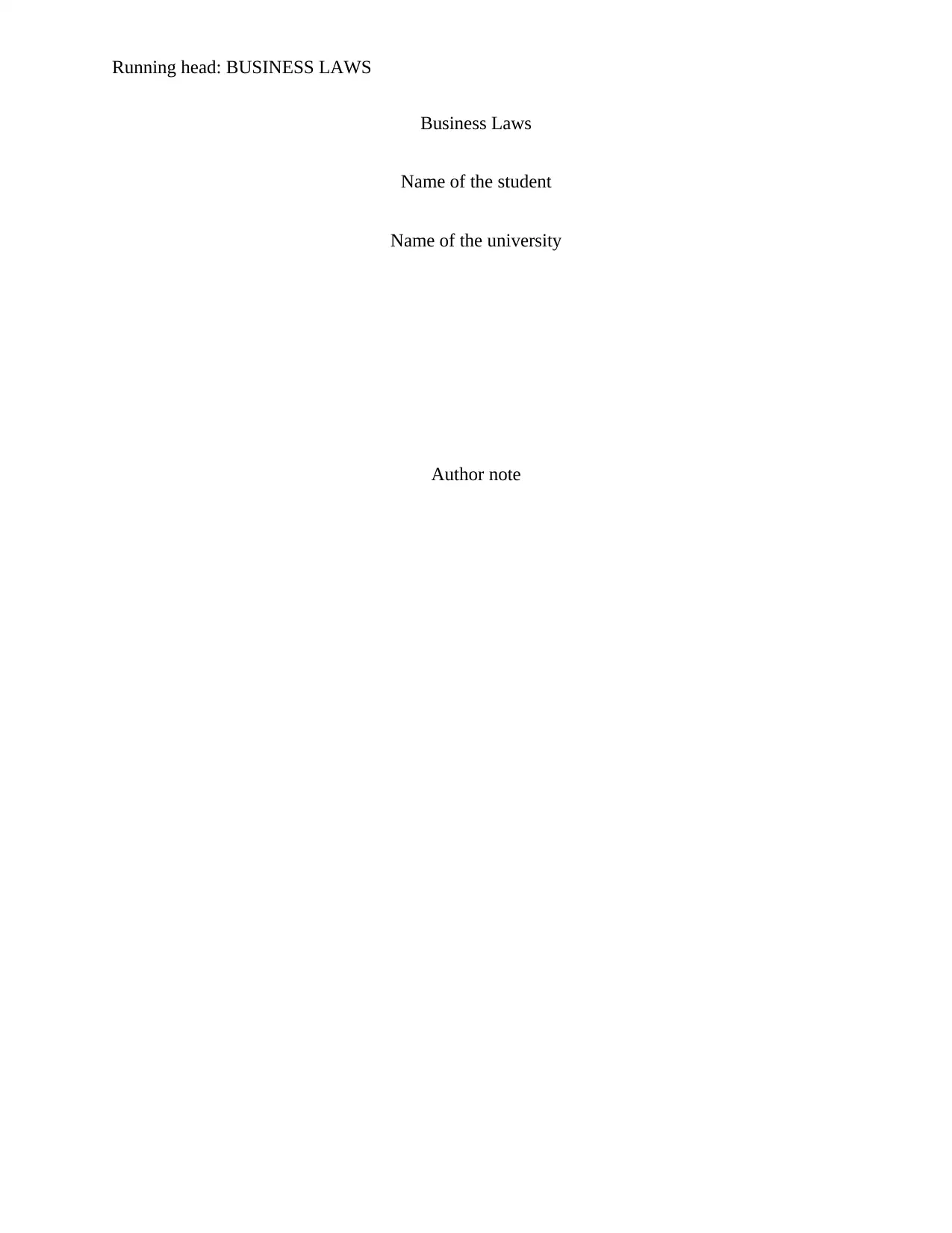
Running head: BUSINESS LAWS
Business Laws
Name of the student
Name of the university
Author note
Business Laws
Name of the student
Name of the university
Author note
Paraphrase This Document
Need a fresh take? Get an instant paraphrase of this document with our AI Paraphraser
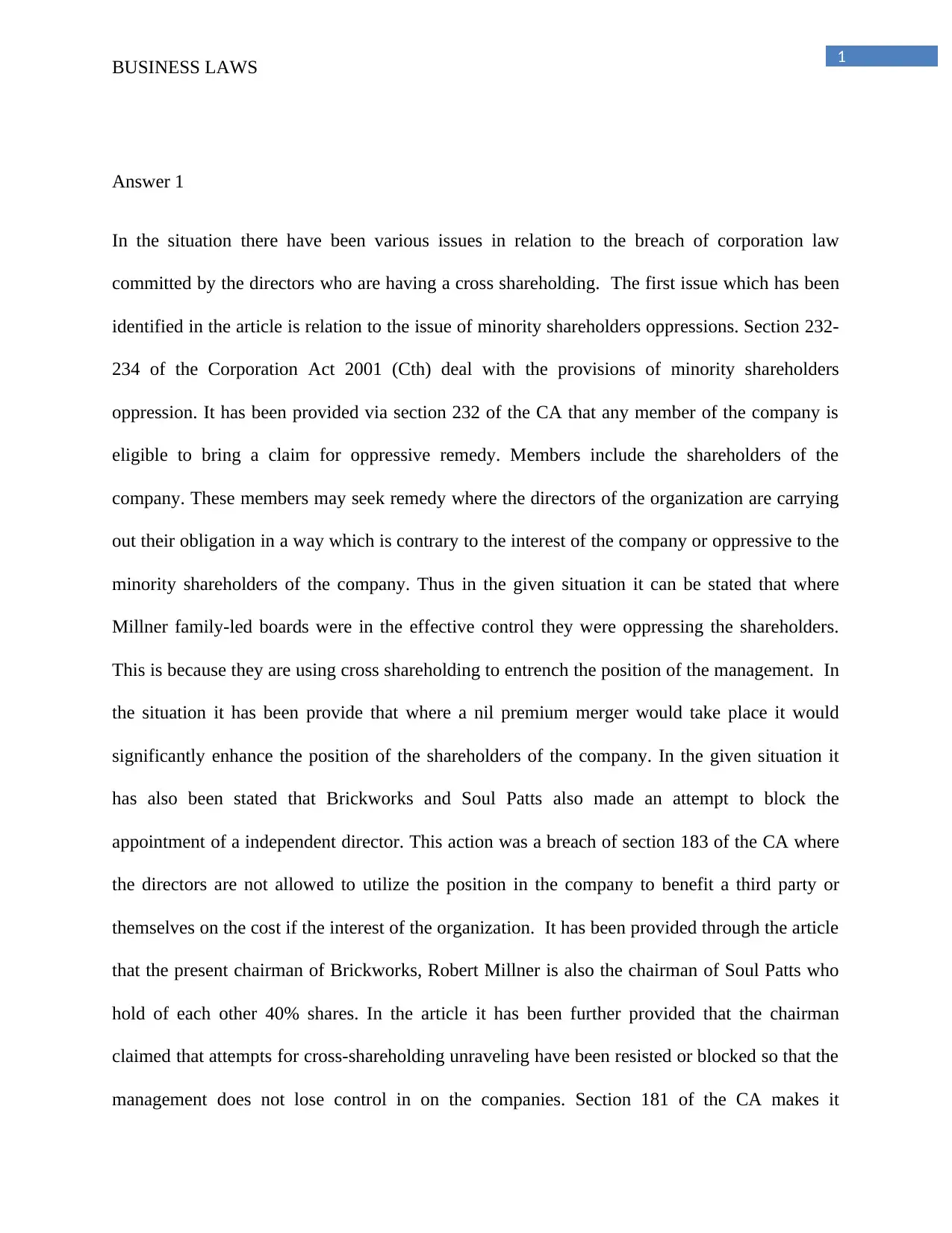
1
BUSINESS LAWS
Answer 1
In the situation there have been various issues in relation to the breach of corporation law
committed by the directors who are having a cross shareholding. The first issue which has been
identified in the article is relation to the issue of minority shareholders oppressions. Section 232-
234 of the Corporation Act 2001 (Cth) deal with the provisions of minority shareholders
oppression. It has been provided via section 232 of the CA that any member of the company is
eligible to bring a claim for oppressive remedy. Members include the shareholders of the
company. These members may seek remedy where the directors of the organization are carrying
out their obligation in a way which is contrary to the interest of the company or oppressive to the
minority shareholders of the company. Thus in the given situation it can be stated that where
Millner family-led boards were in the effective control they were oppressing the shareholders.
This is because they are using cross shareholding to entrench the position of the management. In
the situation it has been provide that where a nil premium merger would take place it would
significantly enhance the position of the shareholders of the company. In the given situation it
has also been stated that Brickworks and Soul Patts also made an attempt to block the
appointment of a independent director. This action was a breach of section 183 of the CA where
the directors are not allowed to utilize the position in the company to benefit a third party or
themselves on the cost if the interest of the organization. It has been provided through the article
that the present chairman of Brickworks, Robert Millner is also the chairman of Soul Patts who
hold of each other 40% shares. In the article it has been further provided that the chairman
claimed that attempts for cross-shareholding unraveling have been resisted or blocked so that the
management does not lose control in on the companies. Section 181 of the CA makes it
BUSINESS LAWS
Answer 1
In the situation there have been various issues in relation to the breach of corporation law
committed by the directors who are having a cross shareholding. The first issue which has been
identified in the article is relation to the issue of minority shareholders oppressions. Section 232-
234 of the Corporation Act 2001 (Cth) deal with the provisions of minority shareholders
oppression. It has been provided via section 232 of the CA that any member of the company is
eligible to bring a claim for oppressive remedy. Members include the shareholders of the
company. These members may seek remedy where the directors of the organization are carrying
out their obligation in a way which is contrary to the interest of the company or oppressive to the
minority shareholders of the company. Thus in the given situation it can be stated that where
Millner family-led boards were in the effective control they were oppressing the shareholders.
This is because they are using cross shareholding to entrench the position of the management. In
the situation it has been provide that where a nil premium merger would take place it would
significantly enhance the position of the shareholders of the company. In the given situation it
has also been stated that Brickworks and Soul Patts also made an attempt to block the
appointment of a independent director. This action was a breach of section 183 of the CA where
the directors are not allowed to utilize the position in the company to benefit a third party or
themselves on the cost if the interest of the organization. It has been provided through the article
that the present chairman of Brickworks, Robert Millner is also the chairman of Soul Patts who
hold of each other 40% shares. In the article it has been further provided that the chairman
claimed that attempts for cross-shareholding unraveling have been resisted or blocked so that the
management does not lose control in on the companies. Section 181 of the CA makes it
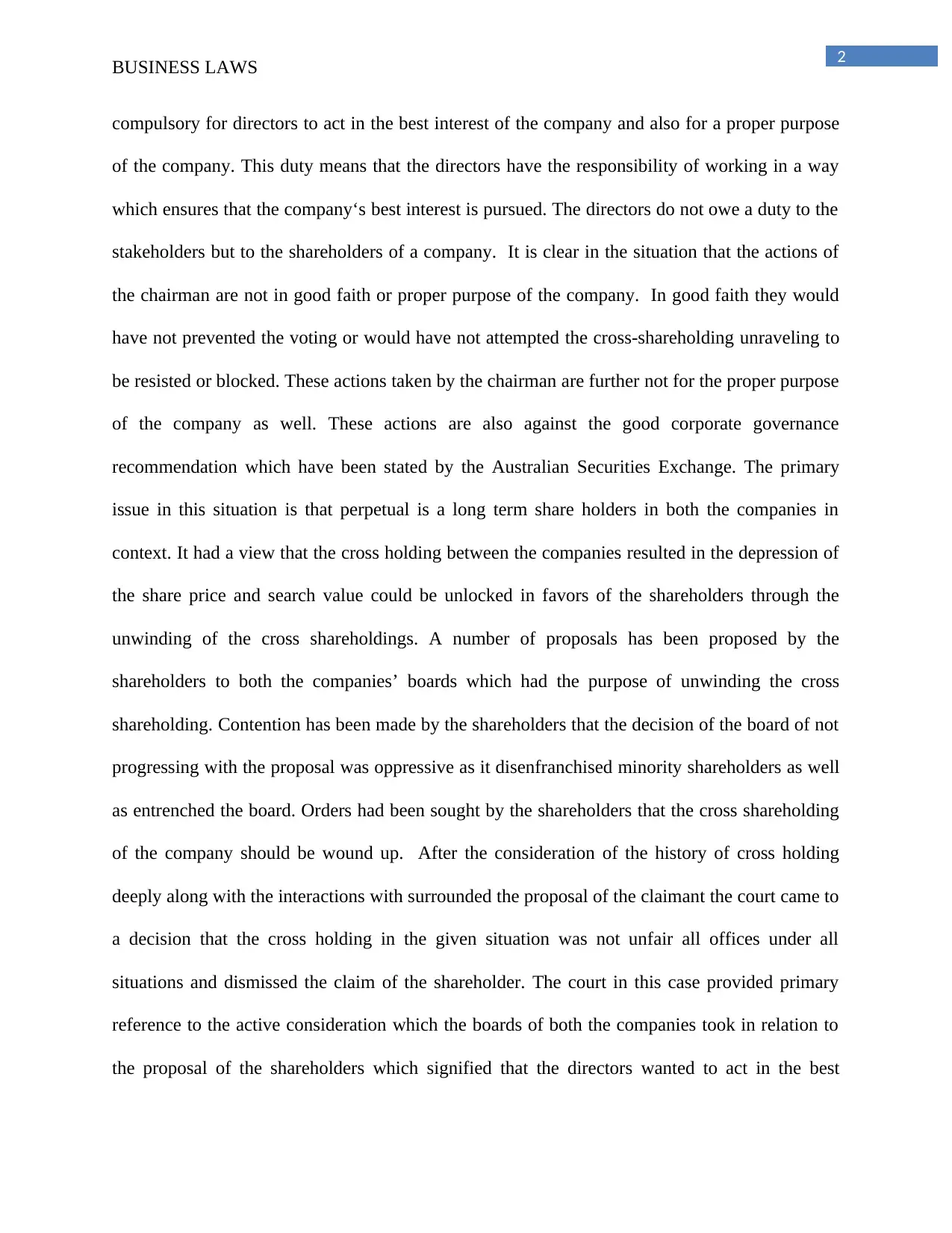
2
BUSINESS LAWS
compulsory for directors to act in the best interest of the company and also for a proper purpose
of the company. This duty means that the directors have the responsibility of working in a way
which ensures that the company‘s best interest is pursued. The directors do not owe a duty to the
stakeholders but to the shareholders of a company. It is clear in the situation that the actions of
the chairman are not in good faith or proper purpose of the company. In good faith they would
have not prevented the voting or would have not attempted the cross-shareholding unraveling to
be resisted or blocked. These actions taken by the chairman are further not for the proper purpose
of the company as well. These actions are also against the good corporate governance
recommendation which have been stated by the Australian Securities Exchange. The primary
issue in this situation is that perpetual is a long term share holders in both the companies in
context. It had a view that the cross holding between the companies resulted in the depression of
the share price and search value could be unlocked in favors of the shareholders through the
unwinding of the cross shareholdings. A number of proposals has been proposed by the
shareholders to both the companies’ boards which had the purpose of unwinding the cross
shareholding. Contention has been made by the shareholders that the decision of the board of not
progressing with the proposal was oppressive as it disenfranchised minority shareholders as well
as entrenched the board. Orders had been sought by the shareholders that the cross shareholding
of the company should be wound up. After the consideration of the history of cross holding
deeply along with the interactions with surrounded the proposal of the claimant the court came to
a decision that the cross holding in the given situation was not unfair all offices under all
situations and dismissed the claim of the shareholder. The court in this case provided primary
reference to the active consideration which the boards of both the companies took in relation to
the proposal of the shareholders which signified that the directors wanted to act in the best
BUSINESS LAWS
compulsory for directors to act in the best interest of the company and also for a proper purpose
of the company. This duty means that the directors have the responsibility of working in a way
which ensures that the company‘s best interest is pursued. The directors do not owe a duty to the
stakeholders but to the shareholders of a company. It is clear in the situation that the actions of
the chairman are not in good faith or proper purpose of the company. In good faith they would
have not prevented the voting or would have not attempted the cross-shareholding unraveling to
be resisted or blocked. These actions taken by the chairman are further not for the proper purpose
of the company as well. These actions are also against the good corporate governance
recommendation which have been stated by the Australian Securities Exchange. The primary
issue in this situation is that perpetual is a long term share holders in both the companies in
context. It had a view that the cross holding between the companies resulted in the depression of
the share price and search value could be unlocked in favors of the shareholders through the
unwinding of the cross shareholdings. A number of proposals has been proposed by the
shareholders to both the companies’ boards which had the purpose of unwinding the cross
shareholding. Contention has been made by the shareholders that the decision of the board of not
progressing with the proposal was oppressive as it disenfranchised minority shareholders as well
as entrenched the board. Orders had been sought by the shareholders that the cross shareholding
of the company should be wound up. After the consideration of the history of cross holding
deeply along with the interactions with surrounded the proposal of the claimant the court came to
a decision that the cross holding in the given situation was not unfair all offices under all
situations and dismissed the claim of the shareholder. The court in this case provided primary
reference to the active consideration which the boards of both the companies took in relation to
the proposal of the shareholders which signified that the directors wanted to act in the best
⊘ This is a preview!⊘
Do you want full access?
Subscribe today to unlock all pages.

Trusted by 1+ million students worldwide
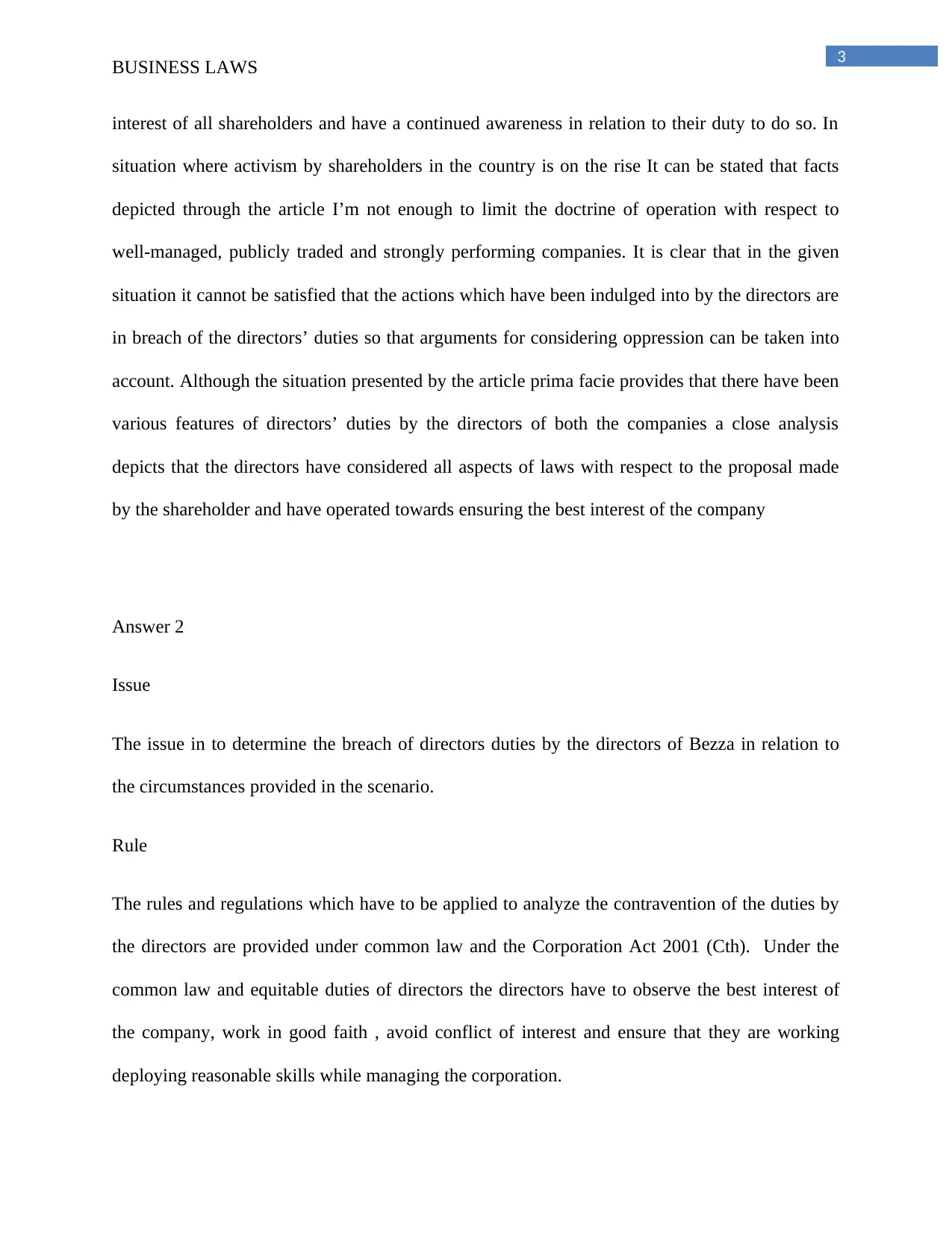
3
BUSINESS LAWS
interest of all shareholders and have a continued awareness in relation to their duty to do so. In
situation where activism by shareholders in the country is on the rise It can be stated that facts
depicted through the article I’m not enough to limit the doctrine of operation with respect to
well-managed, publicly traded and strongly performing companies. It is clear that in the given
situation it cannot be satisfied that the actions which have been indulged into by the directors are
in breach of the directors’ duties so that arguments for considering oppression can be taken into
account. Although the situation presented by the article prima facie provides that there have been
various features of directors’ duties by the directors of both the companies a close analysis
depicts that the directors have considered all aspects of laws with respect to the proposal made
by the shareholder and have operated towards ensuring the best interest of the company
Answer 2
Issue
The issue in to determine the breach of directors duties by the directors of Bezza in relation to
the circumstances provided in the scenario.
Rule
The rules and regulations which have to be applied to analyze the contravention of the duties by
the directors are provided under common law and the Corporation Act 2001 (Cth). Under the
common law and equitable duties of directors the directors have to observe the best interest of
the company, work in good faith , avoid conflict of interest and ensure that they are working
deploying reasonable skills while managing the corporation.
BUSINESS LAWS
interest of all shareholders and have a continued awareness in relation to their duty to do so. In
situation where activism by shareholders in the country is on the rise It can be stated that facts
depicted through the article I’m not enough to limit the doctrine of operation with respect to
well-managed, publicly traded and strongly performing companies. It is clear that in the given
situation it cannot be satisfied that the actions which have been indulged into by the directors are
in breach of the directors’ duties so that arguments for considering oppression can be taken into
account. Although the situation presented by the article prima facie provides that there have been
various features of directors’ duties by the directors of both the companies a close analysis
depicts that the directors have considered all aspects of laws with respect to the proposal made
by the shareholder and have operated towards ensuring the best interest of the company
Answer 2
Issue
The issue in to determine the breach of directors duties by the directors of Bezza in relation to
the circumstances provided in the scenario.
Rule
The rules and regulations which have to be applied to analyze the contravention of the duties by
the directors are provided under common law and the Corporation Act 2001 (Cth). Under the
common law and equitable duties of directors the directors have to observe the best interest of
the company, work in good faith , avoid conflict of interest and ensure that they are working
deploying reasonable skills while managing the corporation.
Paraphrase This Document
Need a fresh take? Get an instant paraphrase of this document with our AI Paraphraser
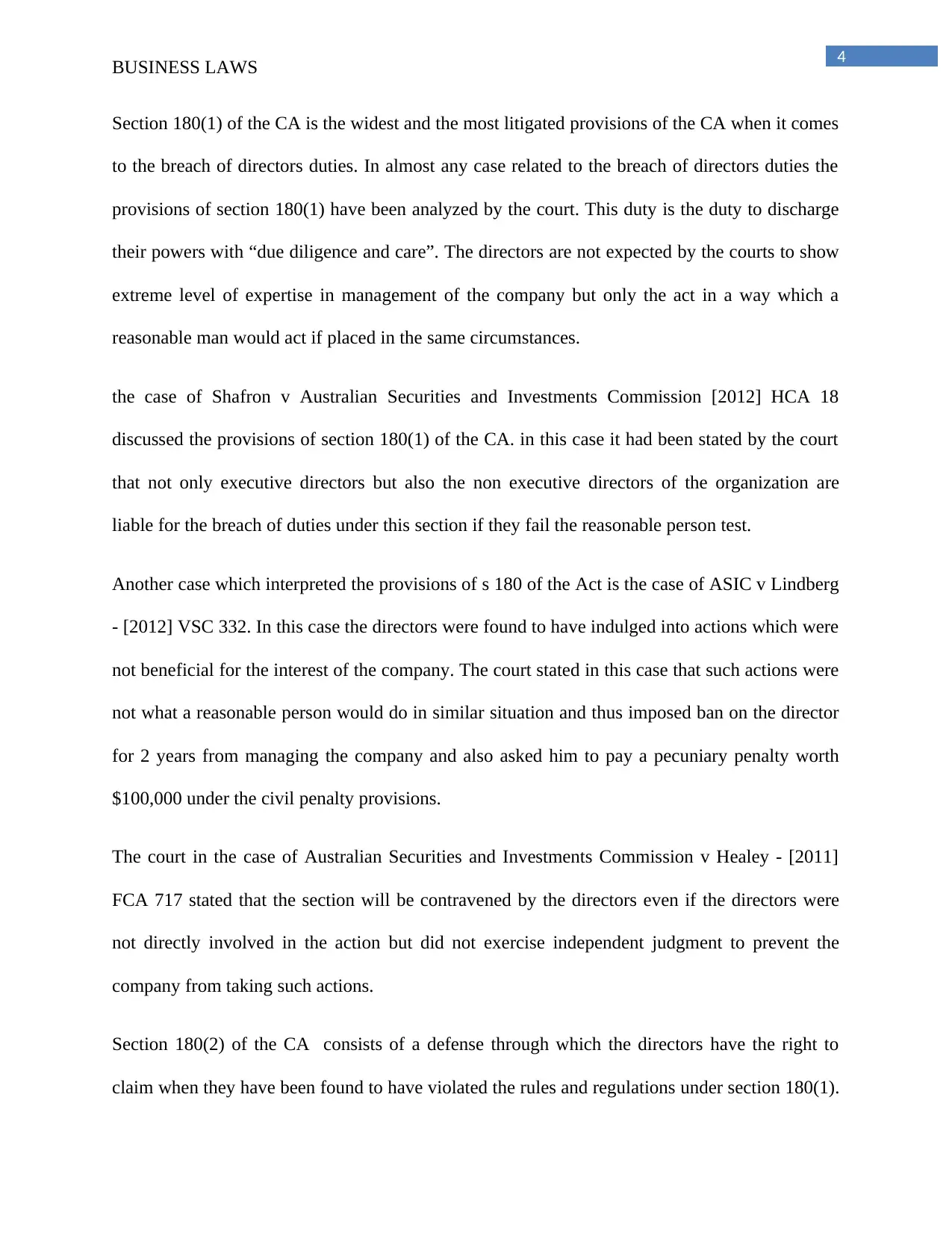
4
BUSINESS LAWS
Section 180(1) of the CA is the widest and the most litigated provisions of the CA when it comes
to the breach of directors duties. In almost any case related to the breach of directors duties the
provisions of section 180(1) have been analyzed by the court. This duty is the duty to discharge
their powers with “due diligence and care”. The directors are not expected by the courts to show
extreme level of expertise in management of the company but only the act in a way which a
reasonable man would act if placed in the same circumstances.
the case of Shafron v Australian Securities and Investments Commission [2012] HCA 18
discussed the provisions of section 180(1) of the CA. in this case it had been stated by the court
that not only executive directors but also the non executive directors of the organization are
liable for the breach of duties under this section if they fail the reasonable person test.
Another case which interpreted the provisions of s 180 of the Act is the case of ASIC v Lindberg
- [2012] VSC 332. In this case the directors were found to have indulged into actions which were
not beneficial for the interest of the company. The court stated in this case that such actions were
not what a reasonable person would do in similar situation and thus imposed ban on the director
for 2 years from managing the company and also asked him to pay a pecuniary penalty worth
$100,000 under the civil penalty provisions.
The court in the case of Australian Securities and Investments Commission v Healey - [2011]
FCA 717 stated that the section will be contravened by the directors even if the directors were
not directly involved in the action but did not exercise independent judgment to prevent the
company from taking such actions.
Section 180(2) of the CA consists of a defense through which the directors have the right to
claim when they have been found to have violated the rules and regulations under section 180(1).
BUSINESS LAWS
Section 180(1) of the CA is the widest and the most litigated provisions of the CA when it comes
to the breach of directors duties. In almost any case related to the breach of directors duties the
provisions of section 180(1) have been analyzed by the court. This duty is the duty to discharge
their powers with “due diligence and care”. The directors are not expected by the courts to show
extreme level of expertise in management of the company but only the act in a way which a
reasonable man would act if placed in the same circumstances.
the case of Shafron v Australian Securities and Investments Commission [2012] HCA 18
discussed the provisions of section 180(1) of the CA. in this case it had been stated by the court
that not only executive directors but also the non executive directors of the organization are
liable for the breach of duties under this section if they fail the reasonable person test.
Another case which interpreted the provisions of s 180 of the Act is the case of ASIC v Lindberg
- [2012] VSC 332. In this case the directors were found to have indulged into actions which were
not beneficial for the interest of the company. The court stated in this case that such actions were
not what a reasonable person would do in similar situation and thus imposed ban on the director
for 2 years from managing the company and also asked him to pay a pecuniary penalty worth
$100,000 under the civil penalty provisions.
The court in the case of Australian Securities and Investments Commission v Healey - [2011]
FCA 717 stated that the section will be contravened by the directors even if the directors were
not directly involved in the action but did not exercise independent judgment to prevent the
company from taking such actions.
Section 180(2) of the CA consists of a defense through which the directors have the right to
claim when they have been found to have violated the rules and regulations under section 180(1).
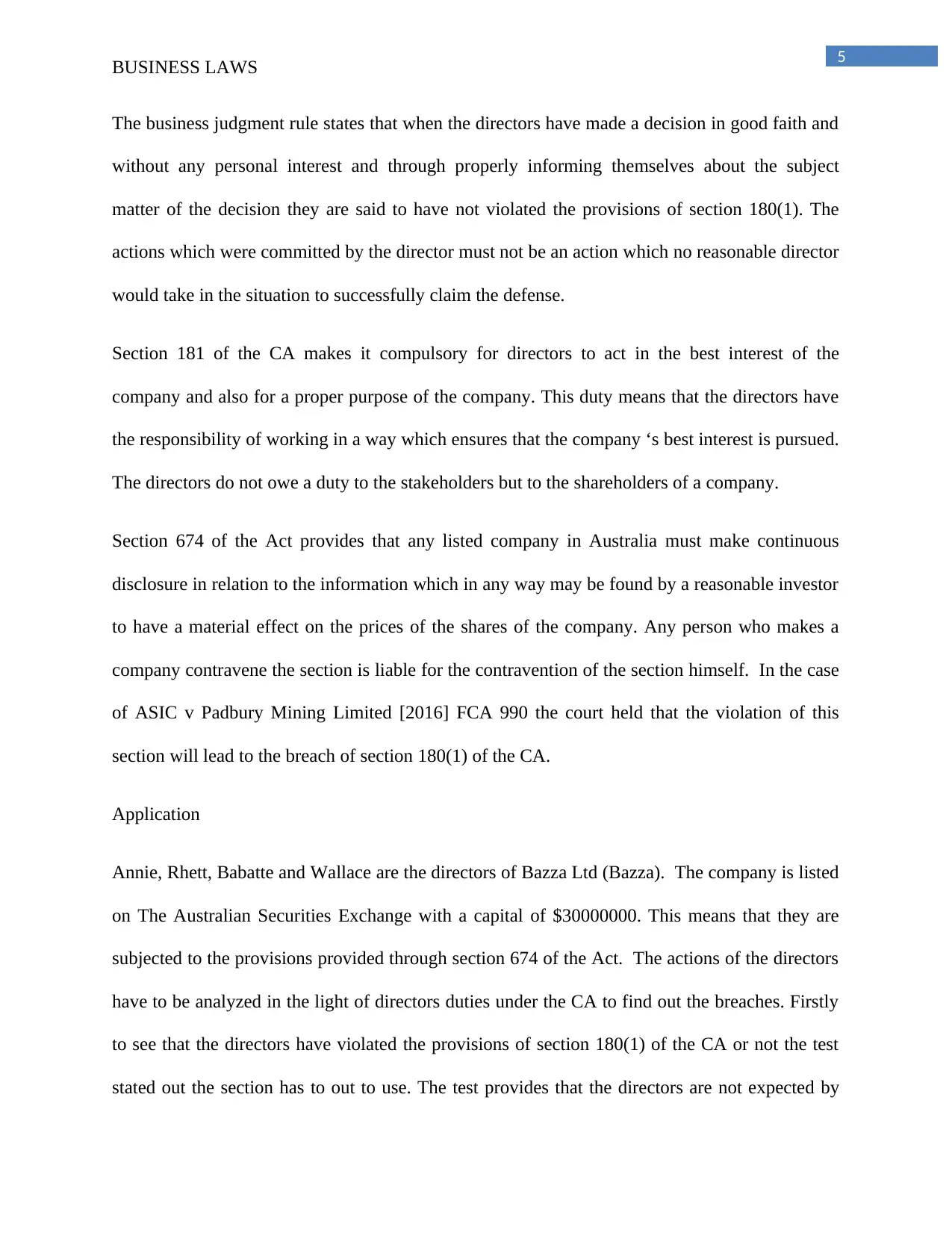
5
BUSINESS LAWS
The business judgment rule states that when the directors have made a decision in good faith and
without any personal interest and through properly informing themselves about the subject
matter of the decision they are said to have not violated the provisions of section 180(1). The
actions which were committed by the director must not be an action which no reasonable director
would take in the situation to successfully claim the defense.
Section 181 of the CA makes it compulsory for directors to act in the best interest of the
company and also for a proper purpose of the company. This duty means that the directors have
the responsibility of working in a way which ensures that the company ‘s best interest is pursued.
The directors do not owe a duty to the stakeholders but to the shareholders of a company.
Section 674 of the Act provides that any listed company in Australia must make continuous
disclosure in relation to the information which in any way may be found by a reasonable investor
to have a material effect on the prices of the shares of the company. Any person who makes a
company contravene the section is liable for the contravention of the section himself. In the case
of ASIC v Padbury Mining Limited [2016] FCA 990 the court held that the violation of this
section will lead to the breach of section 180(1) of the CA.
Application
Annie, Rhett, Babatte and Wallace are the directors of Bazza Ltd (Bazza). The company is listed
on The Australian Securities Exchange with a capital of $30000000. This means that they are
subjected to the provisions provided through section 674 of the Act. The actions of the directors
have to be analyzed in the light of directors duties under the CA to find out the breaches. Firstly
to see that the directors have violated the provisions of section 180(1) of the CA or not the test
stated out the section has to out to use. The test provides that the directors are not expected by
BUSINESS LAWS
The business judgment rule states that when the directors have made a decision in good faith and
without any personal interest and through properly informing themselves about the subject
matter of the decision they are said to have not violated the provisions of section 180(1). The
actions which were committed by the director must not be an action which no reasonable director
would take in the situation to successfully claim the defense.
Section 181 of the CA makes it compulsory for directors to act in the best interest of the
company and also for a proper purpose of the company. This duty means that the directors have
the responsibility of working in a way which ensures that the company ‘s best interest is pursued.
The directors do not owe a duty to the stakeholders but to the shareholders of a company.
Section 674 of the Act provides that any listed company in Australia must make continuous
disclosure in relation to the information which in any way may be found by a reasonable investor
to have a material effect on the prices of the shares of the company. Any person who makes a
company contravene the section is liable for the contravention of the section himself. In the case
of ASIC v Padbury Mining Limited [2016] FCA 990 the court held that the violation of this
section will lead to the breach of section 180(1) of the CA.
Application
Annie, Rhett, Babatte and Wallace are the directors of Bazza Ltd (Bazza). The company is listed
on The Australian Securities Exchange with a capital of $30000000. This means that they are
subjected to the provisions provided through section 674 of the Act. The actions of the directors
have to be analyzed in the light of directors duties under the CA to find out the breaches. Firstly
to see that the directors have violated the provisions of section 180(1) of the CA or not the test
stated out the section has to out to use. The test provides that the directors are not expected by
⊘ This is a preview!⊘
Do you want full access?
Subscribe today to unlock all pages.

Trusted by 1+ million students worldwide
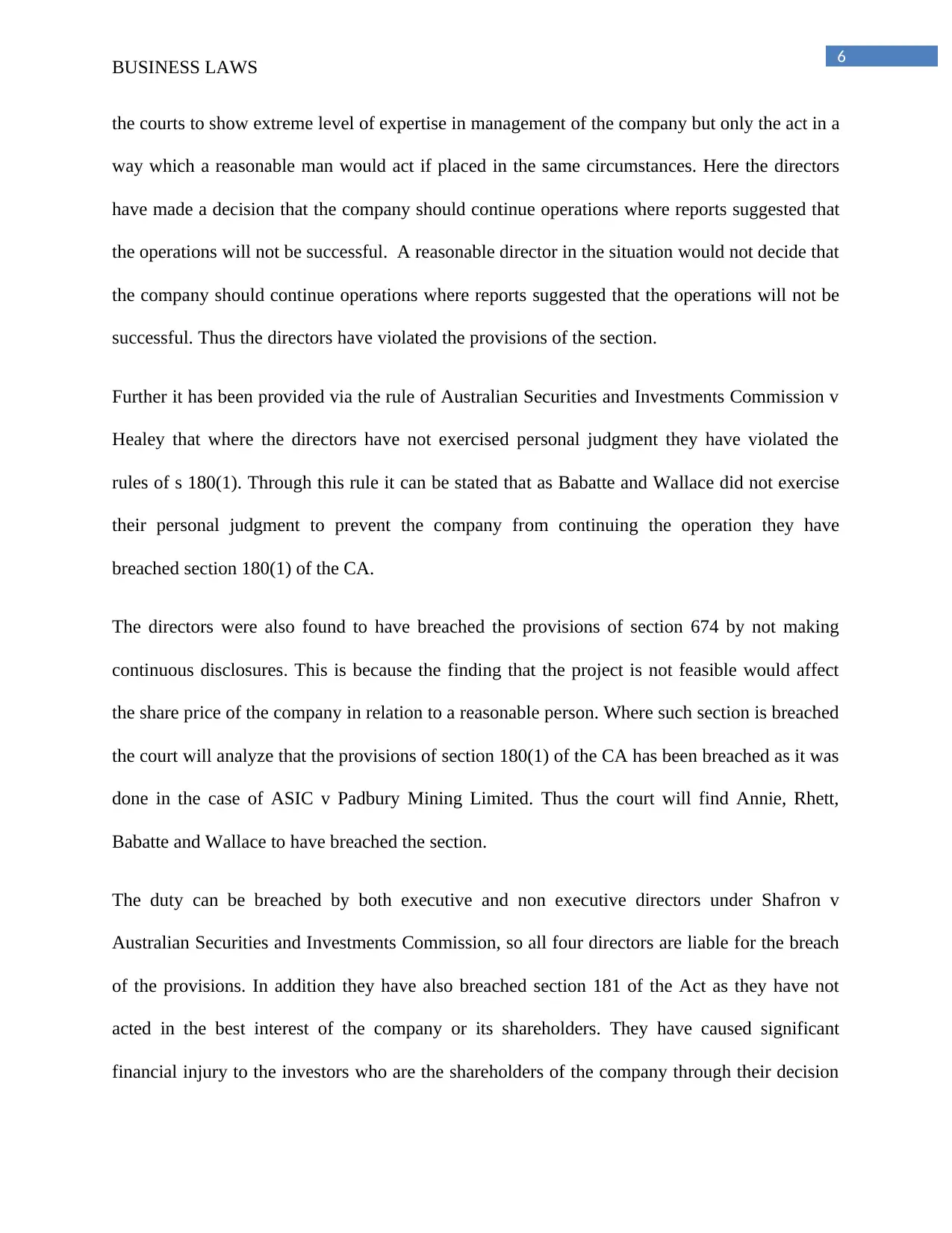
6
BUSINESS LAWS
the courts to show extreme level of expertise in management of the company but only the act in a
way which a reasonable man would act if placed in the same circumstances. Here the directors
have made a decision that the company should continue operations where reports suggested that
the operations will not be successful. A reasonable director in the situation would not decide that
the company should continue operations where reports suggested that the operations will not be
successful. Thus the directors have violated the provisions of the section.
Further it has been provided via the rule of Australian Securities and Investments Commission v
Healey that where the directors have not exercised personal judgment they have violated the
rules of s 180(1). Through this rule it can be stated that as Babatte and Wallace did not exercise
their personal judgment to prevent the company from continuing the operation they have
breached section 180(1) of the CA.
The directors were also found to have breached the provisions of section 674 by not making
continuous disclosures. This is because the finding that the project is not feasible would affect
the share price of the company in relation to a reasonable person. Where such section is breached
the court will analyze that the provisions of section 180(1) of the CA has been breached as it was
done in the case of ASIC v Padbury Mining Limited. Thus the court will find Annie, Rhett,
Babatte and Wallace to have breached the section.
The duty can be breached by both executive and non executive directors under Shafron v
Australian Securities and Investments Commission, so all four directors are liable for the breach
of the provisions. In addition they have also breached section 181 of the Act as they have not
acted in the best interest of the company or its shareholders. They have caused significant
financial injury to the investors who are the shareholders of the company through their decision
BUSINESS LAWS
the courts to show extreme level of expertise in management of the company but only the act in a
way which a reasonable man would act if placed in the same circumstances. Here the directors
have made a decision that the company should continue operations where reports suggested that
the operations will not be successful. A reasonable director in the situation would not decide that
the company should continue operations where reports suggested that the operations will not be
successful. Thus the directors have violated the provisions of the section.
Further it has been provided via the rule of Australian Securities and Investments Commission v
Healey that where the directors have not exercised personal judgment they have violated the
rules of s 180(1). Through this rule it can be stated that as Babatte and Wallace did not exercise
their personal judgment to prevent the company from continuing the operation they have
breached section 180(1) of the CA.
The directors were also found to have breached the provisions of section 674 by not making
continuous disclosures. This is because the finding that the project is not feasible would affect
the share price of the company in relation to a reasonable person. Where such section is breached
the court will analyze that the provisions of section 180(1) of the CA has been breached as it was
done in the case of ASIC v Padbury Mining Limited. Thus the court will find Annie, Rhett,
Babatte and Wallace to have breached the section.
The duty can be breached by both executive and non executive directors under Shafron v
Australian Securities and Investments Commission, so all four directors are liable for the breach
of the provisions. In addition they have also breached section 181 of the Act as they have not
acted in the best interest of the company or its shareholders. They have caused significant
financial injury to the investors who are the shareholders of the company through their decision
Paraphrase This Document
Need a fresh take? Get an instant paraphrase of this document with our AI Paraphraser
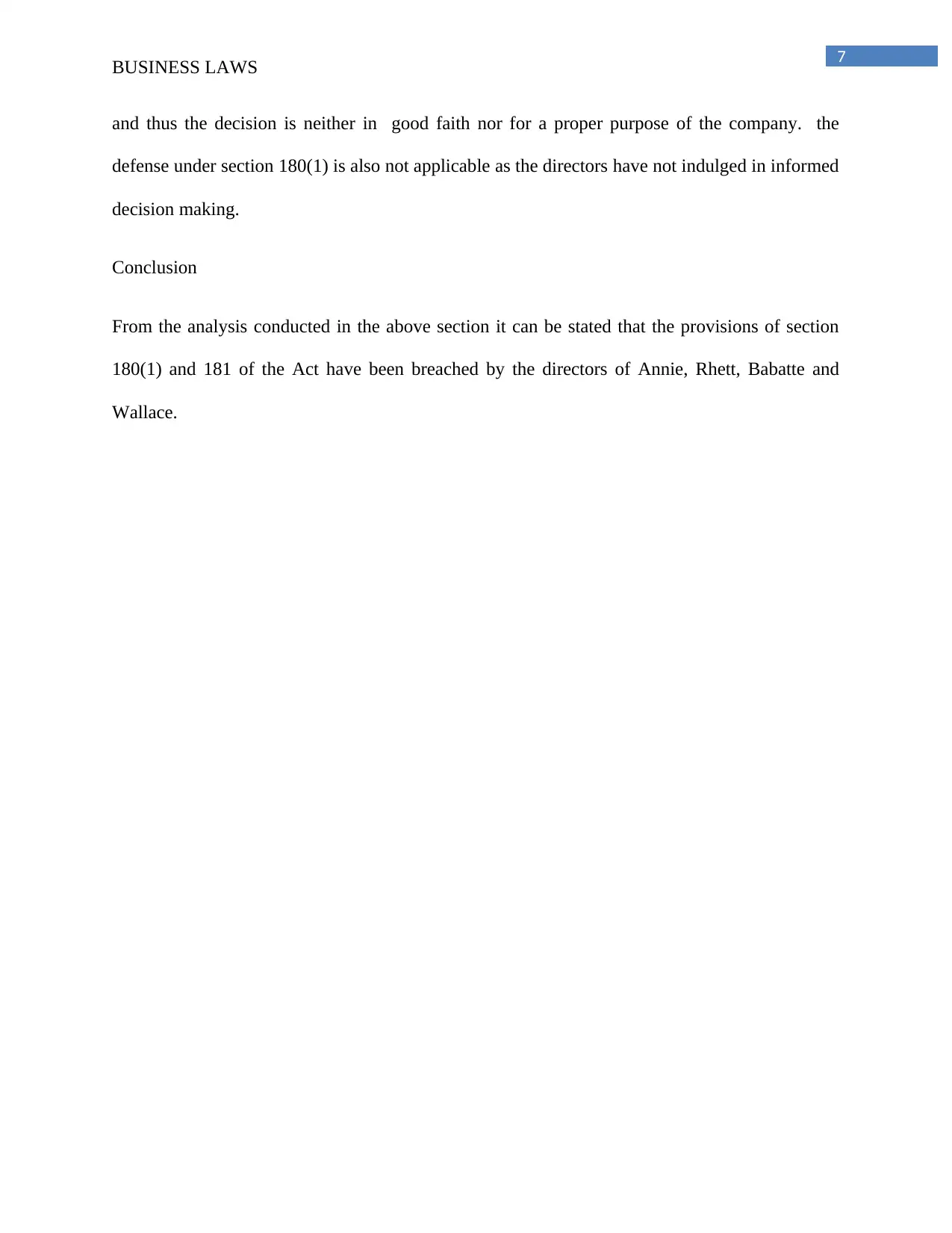
7
BUSINESS LAWS
and thus the decision is neither in good faith nor for a proper purpose of the company. the
defense under section 180(1) is also not applicable as the directors have not indulged in informed
decision making.
Conclusion
From the analysis conducted in the above section it can be stated that the provisions of section
180(1) and 181 of the Act have been breached by the directors of Annie, Rhett, Babatte and
Wallace.
BUSINESS LAWS
and thus the decision is neither in good faith nor for a proper purpose of the company. the
defense under section 180(1) is also not applicable as the directors have not indulged in informed
decision making.
Conclusion
From the analysis conducted in the above section it can be stated that the provisions of section
180(1) and 181 of the Act have been breached by the directors of Annie, Rhett, Babatte and
Wallace.
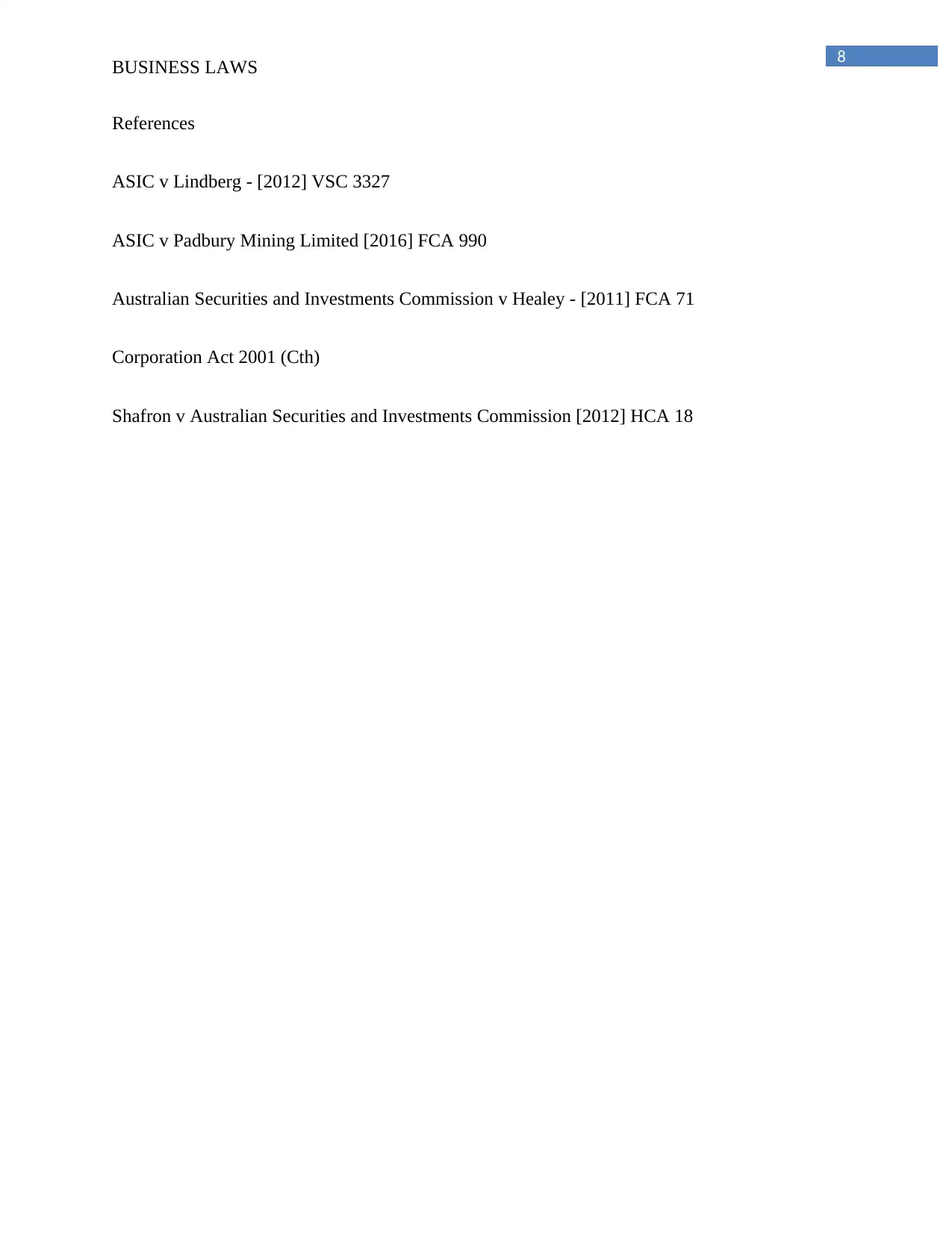
8
BUSINESS LAWS
References
ASIC v Lindberg - [2012] VSC 3327
ASIC v Padbury Mining Limited [2016] FCA 990
Australian Securities and Investments Commission v Healey - [2011] FCA 71
Corporation Act 2001 (Cth)
Shafron v Australian Securities and Investments Commission [2012] HCA 18
BUSINESS LAWS
References
ASIC v Lindberg - [2012] VSC 3327
ASIC v Padbury Mining Limited [2016] FCA 990
Australian Securities and Investments Commission v Healey - [2011] FCA 71
Corporation Act 2001 (Cth)
Shafron v Australian Securities and Investments Commission [2012] HCA 18
⊘ This is a preview!⊘
Do you want full access?
Subscribe today to unlock all pages.

Trusted by 1+ million students worldwide
1 out of 9
Related Documents
Your All-in-One AI-Powered Toolkit for Academic Success.
+13062052269
info@desklib.com
Available 24*7 on WhatsApp / Email
![[object Object]](/_next/static/media/star-bottom.7253800d.svg)
Unlock your academic potential
Copyright © 2020–2026 A2Z Services. All Rights Reserved. Developed and managed by ZUCOL.





